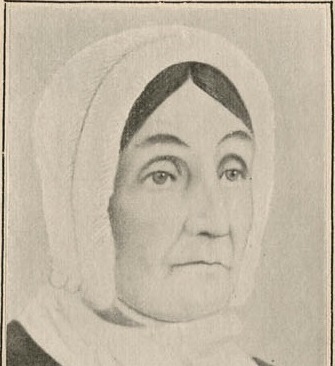In the heat of June, 1813, Laura Secord trekked 20 miles through countryside and swamp to warn the British of an American attack. With her advance notice, native warriors and British officers captured the entire force, marking the downturn of the American invasion of Upper Canada.
"to save the British troops from capture or perhaps total destruction"
Laura Secord explaining her decision to trek through the wilderness

Library and Archives Canada
After the American army invaded Upper Canada in May 1813, the U.S. controlled the area along the Niagara River from Fort George to Fort Erie. The British army had retreated nearly thirty miles to regroup. Local inhabitants were left to fend for themselves under the American occupation.
In the war-torn town of Queenston, Laura Secord was nursing her wounded husband back to health when she heard about a planned American offensive. An American officer reported that the small British force guarding a storehouse at Beaver Dams could easily be captured with only 500 men. On June 22, while the Americans mustered their troops, Secord decided she must warn the British.
American soldiers patrolled the roads between Queenston and Beaver Dams, so Secord was forced to walk across the countryside and through an area marked on maps as the “Black Swamp.” By early morning on June 23, she had walked nearly twenty miles.
As she approached Beaver Dams, native warriors emerged from their camps and stopped her. Once she explained her purpose, they agreed to escort her to the British commander. Secord met Lt. James FitzGibbon at his headquarters and informed him of the impending attack.
FitzGibbon later wrote, “Mrs. Secord was a person of slight and delicate frame and made this effort in weather excessively warm, and I dreaded at the time that she must suffer in health in consequence of fatigue and anxiety.”
Secord’s warning foiled the American plan. When their force arrived, native warriors ambushed them on the road. When FitzGibbon arrived to offer terms of surrender, the American officers agreed. Despite the fact that no British soldiers engaged in the battle, FitzGibbon received credit for the victory.
Secord's choice to make such a difficult and dangerous journey indicates her resistance to the American occupation. Her husband was a soldier, and she came from a Loyalist family that had left Massachussetts during the American Revolution. Whether motivated by loyalty to the crown or concern over the safety of her family. Secord’s warning was decisive in the campaign. The British eventually regained possession of the region, and Secord continued to live there and raise her family until her death in 1868.
Last updated: September 14, 2017
